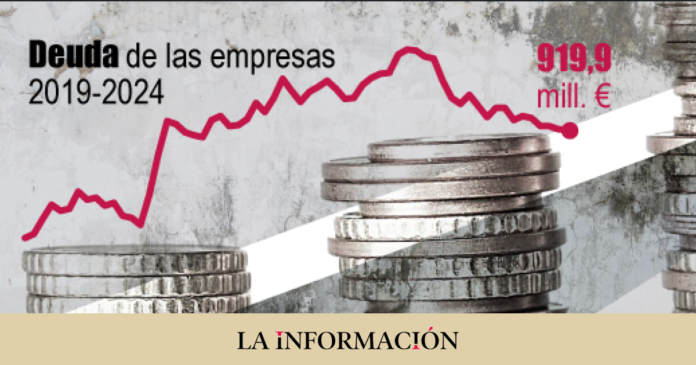Spanish companies join households and avoid high interest rates as much as possible. According to the latest data from the Bank of Spain (BdE) corresponding to February, the total outstanding balance of financing for non-financial companies closed the second month of the year at 919,954 million. This represents 13,000 million less compared to the same period of the previous year, the equivalent of a drop of 1.3%. Although this decline is the lowest recorded in the last ten months, the amount falls below 920,000 million, something that has not happened since September 2020, in the middle of the pandemic.
The State of Alarm Decree in March 2020 forced companies to resort to credit to keep the business afloat in the face of the paralysis of activity. Four years later, the volume of the aforementioned outstanding balance begins to approach pre-Covid levels and is only 47,379 million away from the ‘old normal’ since February 2020 ended at 872,575 million. The cost of borrowing or going to the capital market has increased dramatically since the European Central Bank (ECB) reversed its monetary policy in July 2022, a situation that has prompted organizations to seek to reduce their dependence on external funds. In fact, since the peak of 960,000 million recorded in August of that year, the trend has been downward.
This behavior is supported by several vectors. One of them is the contraction of bank debt, which although it has risen slightly by 135 million compared to January, when compared to the maximum since the pandemic, when it exceeded 494,000 million, the amount has gradually decreased and reaches spring 2024 over 453 billion. The process has been especially pronounced in recent months with monthly losses of more than 3%. Both the use of liquidity to reduce liabilities and lower demand from companies have influenced this evolution.
The other reason is found in the bond market, which has had a downward trajectory since the starting signal for raising rates in the eurozone, cutting the balance of issues by just over 5,000 million since then, to 132,314 million. However, when compared to the beginning of the health emergency, it is almost 11,000 million higher. On the contrary, foreign financing has rebounded compared to these two reference periods after reaching 334,556 million. Deleveraging stands as the dominant trend among companies a few months after the ECB begins to reverse the process of raising the reference money rates, a movement that is expected to occur from the second half of the year.
They follow the path projected by households, which have gathered savings to get rid of the mortgage, an item that represents the majority of the debt, with 73% of the total. Specifically, the balance of loans for housing amounts to 494,157 million, hitting a new low since 2006 after it fell below 500,000 million in the middle of last year. The use of impounded savings to repay early has skyrocketed as a result of its free nature included in the Code of Good Practices for mortgage holders in trouble, pushing the total credit granted by entities to 677,961 million, an unprecedented amount in almost 18 years.
In this context of slowing credit activity, banks have chosen to refine their commercial strategy with promotions focused on attracting the self-employed and SMEs, segments that represent the bulk of the productive fabric in Spain. The premise is to facilitate the linking of this type of clients so that they will become the reference entity with hook offers that range from cash payments to the compensation of Social Security contributions. To this we must add the higher remuneration they offer for deposits with an interest of 3.59% in January (the latest data available), which is 50% higher than the 2.36% average stipulated for individuals.

